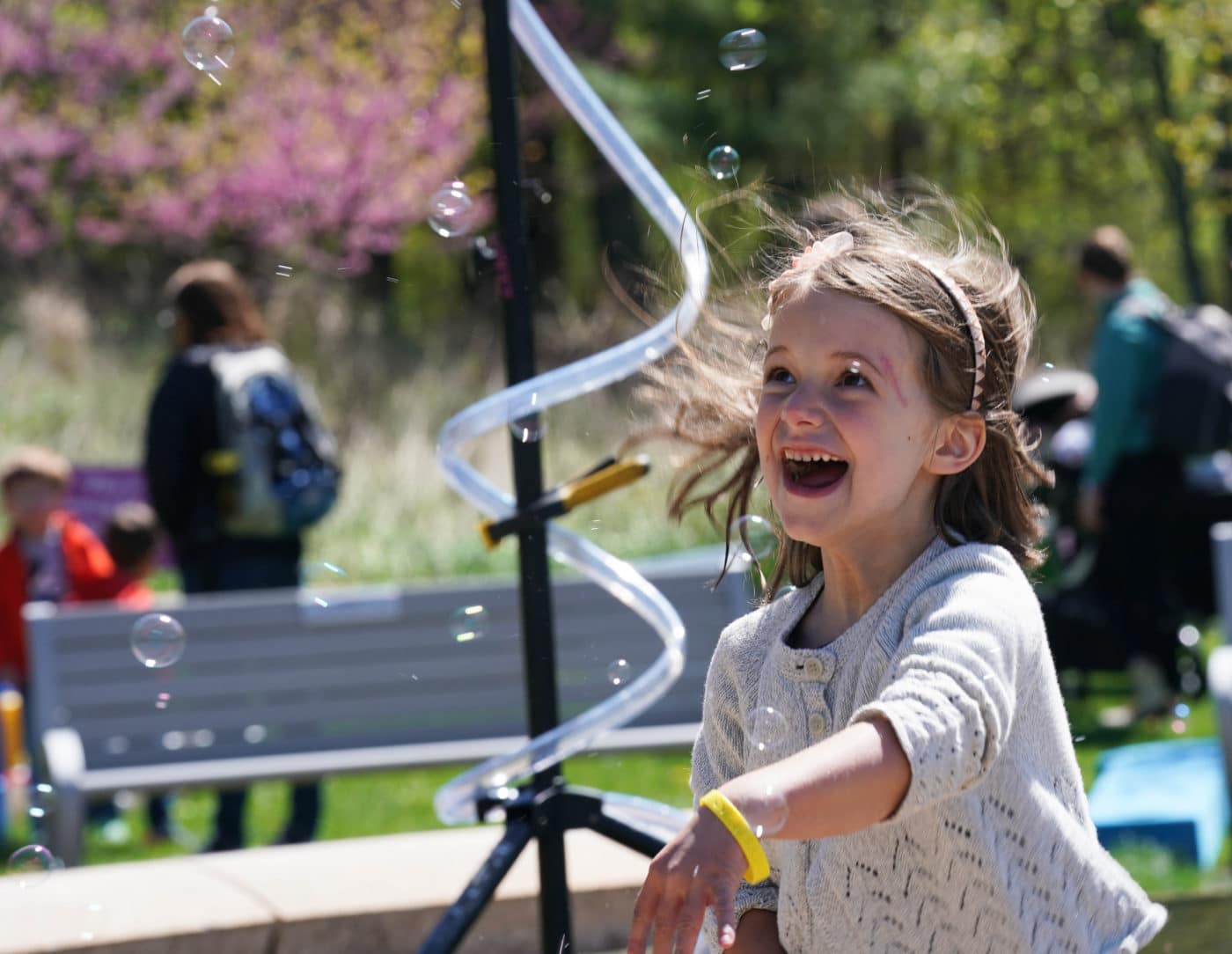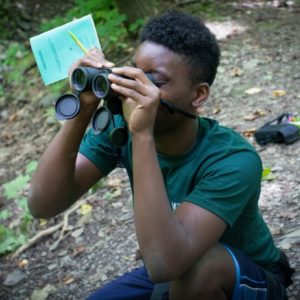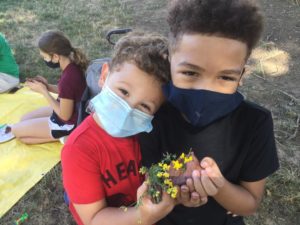
Kidsburgh Learning Guide: Discovering the joy of outdoor learning
All year round, the Pittsburgh region is full of great opportunities to explore outdoors — and build knowledge about science, math and the environment along the way.
We’ve asked some of our region’s many outdoor learning experts for their advice on helping kids and families discover a love of outdoor learning.
WHERE TO BEGIN
“Sometimes folks have some trepidation that they don’t know what’s out there. They don’t have a science background. But your interest and your curiosity is probably the most important thing. You don’t need to know the answers,” says Jen Schnakenberg, the Pittsburgh Parks Conservancy’s assistant director of education. “You just want to be able to be with your kid and help them ask the questions.”
In fact, she says, it may be even more valuable if you don’t know a lot about the environment. Caregivers who are new to outdoor learning can model the habit of finding out more. By exploring together, you’ll show your child how much fun it can be to ask questions and learn new things.
We know that spending time in nature can help kids build science and math skills, and the outdoors can provide inspiration for art and maker work. But there’s more: Along with those benefits, time spent in nature also supports good mental health, good physical health and can even improve focus.
“There’s a fair amount of research showing that it helps with attention, particularly for students who have attention deficit or hyperactivity,” Schnakenberg says. “There are tremendous benefits to being outside and often the learning is sort of secondary.”
WHAT YOU CAN DO
There are so many ways to make outdoor learning happen for your family.
SCIENCE ON YOUR STREET
You don’t need to live near a sprawling park in order to explore nature with your child. “There’s a whole ecosystem in a sidewalk crack,” Schnakenberg says. “A cheap magnifying glass opens up a whole tiny world of possibility.”
As you take a close-up look at what’s growing (and crawling and flying!) right outside your home, try a simple project like pressing leaves or making sun-print art.
The Parks Conservancy also recommends doing “loose parts play” with things like sticks, stones, acorns, pinecones. You can ask kids to create an imaginary habitat for an animal they like, and as they build you can discuss what that animal might eat or the kind of home where it might live.
Kids can come up with answers from their imagination and then, together, you can research the actual homes and diets of these animals.
Gardening in your own yard or in a neighborhood garden can also help kids discover outdoor living. With younger kids, the Carnegie Library of Pittsburgh recommends beginning by reading through some picture books about gardening and the outdoors (find a list of books here) and trying a range of hands-on activities listed here. You can also explore gardens that have been planted around the public parks.
Grow Pittsburgh is a nonprofit that supports backyard gardeners (and urban farmers, too) and a great place to get kids involved in volunteering.
Another cost-free, easy option right where you live: Go for a walk, looking and listening for birds. When you see one that interests you, try the Merlin bird identification app or the eBird website to look up what it might be.

EXPLORING THE PARKS
In 2018, Pittsburgh’s chief resilience officer Grant Ervin told WESA-FM that the city’s goal was to make sure every resident would live within 10 minutes’ walking distance from a green space. Pittsburghers are making progress toward that goal, the Parks Conservancy says, and there are now 165 green spaces within the city limits.
Some are “parklets” and SMALL neighborhood playgrounds. Others are enormous, like the 600-acre Frick Park, home to the Frick Environmental Center. This directory will help you find each one.
Nearly two dozen park activity sheets are available to help you make the most of these parks. They offer ideas for park-specific games and scavenger hunts, plus details on how to reach the parks by public transportation.
The Parks Conservancy also offers information about discovering nature in your neighborhood and they have a range of in-person programs for kids of various ages. They also offer online learning resources: Check out their Parks on the Go guide to exploring the outdoors from anywhere.
To make your park explorations even more exciting, try using the Agents of Discovery app, which offers “missions” you can undertake. Schnakenberg says it’s very much like Pokemon Go, in that you’re experiencing real-world places but pursuing the game’s mission.

BIRDS AND BUGS, FLOWERS AND FOLIAGE
Pittsburgh is full of wonderful things to discover outdoors. Round Hill Park, part of the county system, covers more than 1,000 acres in Elizabeth Township. It includes a working farm where you can book a tour.
You can also check out programming at the Children’s Museum, where kids can learn about worms, seeds and much more. Another local treasure: the Pittsburgh Botanic Garden. And at Phipps Conservatory, you can explore indoor and outdoor gardens, as well as a range of programs for kids.
At Tree Pittsburgh, families can learn about restoring and protecting the urban forest. Also consider the Allegheny County Parks Foundation, which has a range of projects currently underway. And the National Aviary, located on Pittsburgh’s North Side, is your homebase for learning all about our feathered friends. They offer in-person animal encounters, afterschool programming and summer camps.
If you’re looking for an indoor experience (great for rainy days) that will teach you about the outdoor world, go exploring at the Carnegie Museum of Natural History. From the Bird Hall to the Hillman Hall of Minerals and Gems, it’s a great place to discover the natural world. Their summer camp offerings for 2021 include “Backyard Biology” for kids ages 6-7.
Another key place for outdoor learning in the region is the Frick Environmental Center. As of late June, the Environmental Center remains closed due to COVID concerns. We’ll update this guide once this living building reopens.
DIGITAL DISCOVERIES
The Parks Conservancy created a lot of online resources for teachers during the pandemic, but they’re also great for families to use. Check out this range of educational tools, broken down by age group. From Nature School for kids 3-5 all the way up through the High School Urban Ecosteward program, you can find digital support for online learning.
The Aviary also offers virtual classes and programs, as does the Children’s Museum, where kid-focused programming includes “Digging for Worms” and “Garbage Gardening.”
GEOCACHING
Dive into outdoor learning with geocaching, which has been called the world’s largest treasure hunt. Through a geocaching app, you can explore your area and find tiny treasures hidden by others. Nearly 3,000 geocaches are socked away around the Pittsburgh area – some tiny and hidden in public spaces like parking lots, while others are embedded deep in the brush of parks.
Carrie Nardini, founder of Pittsburgh’s “I Made It! Markets,” says she and her son have explored Peters Township by hunting for geocaches. Each time they find one, they “leave a little trinket or take a little trinket or both.” A bonus: Write your name in the logbook so those who follow can see your footprints.
As your children look for and find geocaches with you, they explore the landscape around their communities, Nardini says: “It leads to so much outdoor learning.”
REVEL IN THE RIVERS
In Pittsburgh, no exploration of the outdoors would be complete without visiting at least one of the three rivers. Venture Outdoors offers a wide range of family programming. Trianglers Lunchtime Fishing events welcome kids and grownups to learn all about fishing, with no prior experience necessary. And their summer camp activities include outdoor science experiments.
STARGAZING
Mingo Creek Park Observatory is the largest amateur astronomical observatory in southwestern Pennsylvania. It hosts free star parties where families can discover stargazing. Although none are scheduled at the moment (thanks, COVID), hopefully they’ll be resuming very soon.
No matter how you engage with outdoor learning, this is an important year to explore outside and find joy in nature.
“As much as folks are concerned about learning loss, I think also there’s been a loss of freedom and playfulness,” Schnakenberg says. “Even if you’re doing that play with sticks or stones, you can be counting and sorting and categorizing, and those are really foundational math and science skills.”
Rather than worrying about exactly how much learning is happening, enjoy your time outdoors. The key: Spend time letting your curiosity chart your course. As you look and listen and ask about what’s around you, the whole family can develop a deeper connection and understanding of the natural world – something that can last long after the weekend outdoors is over.
QUICK LIST OF LINKS
Here’s a directory of resources mentioned in this guide:
Allegheny County Parks Foundation
Carnegie Library of Pittsburgh
Carnegie Museum of Natural History
Merlin app for bird identification
Mingo Creek Observatory/star parties
You can also check out our additional Learning Guides about art, maker learning, science, technology and youth voice.